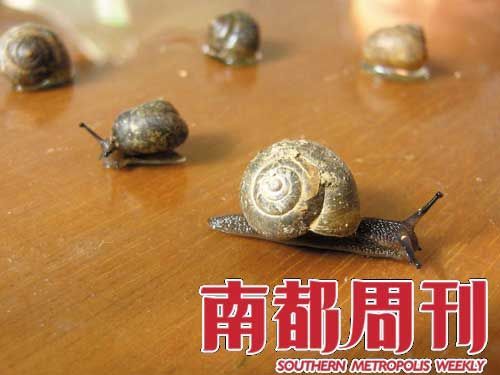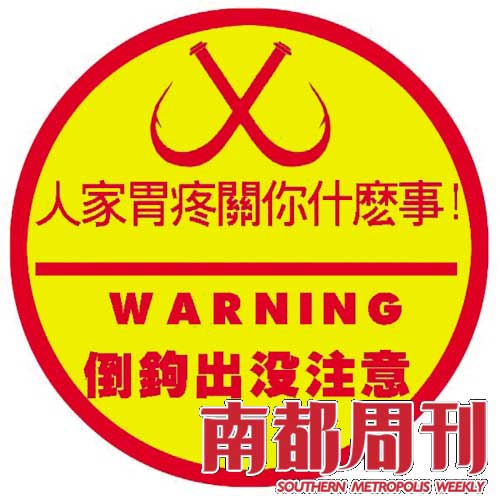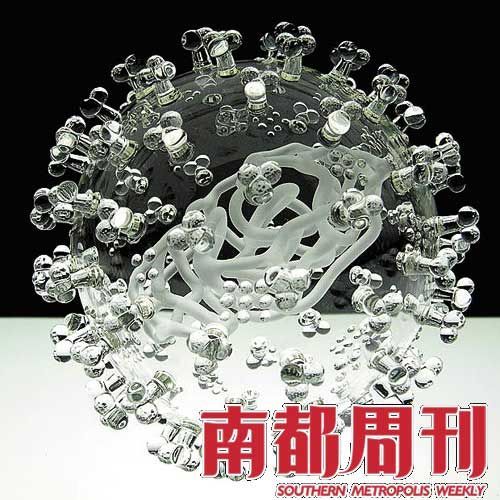From the Southern Metropolis Weekly, 2009-12-25, translated by CDT’s E. Shih:
The “swine” flu that continues taking lives and the “kitty cat” hide-and-seek game of truth; the widely castigated law enforcement by “fishing”; the “snail-dwelling” tribe filled with indignation; the “deceptive horse” that lies to your face…It’s all a “five form fist” of a life full of chaotic violation.
My colleague in the editorial department said that this year, “animals prowled ferocious and free, and human life was full of unspeakable suffering.” I strongly agree. Why was this so? If we take a look at this year’s hot neologisms, you’ll soon understand. The “swine” flu that continues taking lives and the “kitty cat” hide-and-seek game of truth; the widely castigated “fishing” laws; the “snail-dwelling” tribe filled with indignation; the “deceptive horse” that lies to your face…It’s all a “five form fist” of a life full of chaotic violation.
These ferocious “animals” are all fictional, and they are the projection or allegory for a life of unspeakable suffering. There are things that we just couldn’t let go of this year, whether it was everyday life, the system, or society. The forms of language and the creation of phrases are both one kind of emotional expression of the people. When new phrases are created, they express the overall emotion of people’s lives in 2009.
Last year, Southern Weekly was the first among national media to establish a special feature on neologisms. This feature documented the birth of neologisms and the social forces behind them. And in 2009, we documented the social life of 2008 in a Shanzhai Dictionary format.
This year, we announce the top ten neologisms in cooperation with “Baidu Encylopedia,” using this model to examine public life in 2009. The chosen neologisms were all trendy this year. Some come from flashpoint news incidents and some come from serious social phenomena; but all the phrases were widely used in online media. Our criteria included search statistics, media attention, web users participation, etc.
The top 10 neologisms:
1, The passive tense era 被时代
2, Hide-and-seek (hide the kitty cat) 躲猫猫
3, Snail-dwelling tribe 蜗居族
4, Law enforcement by fishing 钓鱼执法
5, Influenza A H1N1 Flu 甲型H1N1流感
6, Impromptu quality 临时性
7, Scale the Wall 翻墙
8, Second generation poor 穷二代
9, 70 Yard 70码
10, Pressure differential 压力差For more content, please visit the Baidu Encyclopedia at baike.baidu.com.
1. The Passive Tense Era 被时代
Definition: Chinese netizens added the passive tense “bei” prefix to “suicide,” “find a job,” “grow,” “represent” and “web addiction” to express the frustration of the powerless who have been denied the freedom of speech. This neologism sparked discussion among netizens as soon as it appeared. The representative phrases of the “passive tense era” are “to be suicided,” “to be grown,” “to be represented,” “to be volunteered,” “to be found a job,” “to be web addicted,” etc. As a general rule, it is an action that can only be taken by an individual, but has become passive. The masses, in gathering the above phrases, cause us to live in a “passive tense era,” when you could be subjected to the passive at any moment. This structural institution is sometimes like a huge, mysterious power that leaves you no room for escape. This set of phrases expresses suspicion at certain actions, and a dissatisfaction with the powerful. It hides the desire of the people for individual rights.
Background: In order to report a better statistic, or to edit the truth of certain events, some officials exaggerate public reports. This kind of phenomenon seems to have been around for a long time. One recent Yingjie university graduate posted an online comment, indicating that he had been mysteriously “found a job” without his knowledge. The work contract sported the company stamp of a company that he had never even heard of. In actuality, the student never had a work position. This was called “to be found a job” (bei jiu ye) by netizens. Regarding an inexplicable report of per capita income growth from the national statistics bureau, another netizen coined the neologism “to be grown” on July 29, 2009. That the numbers were “grown” means that there was not actual growth in income, but the number was “caused to grow” by the statistics bureau.
Commentary: It is easier to pass the winter with many blankets; but when there are too many blankets, it becomes the heavy weight of a succubus.
Example of usage: In the “passive tense era,” schools have started allocating jobs, but not positions and salary.Number of searches on Baidu Encyclopedia: about 281,092.
2. Hide-and-seek (hide the kitty cat) 躲猫猫
Definition: Originally, this indicated a game. When a Yunnan man, Li Qiming, died in policy custody, some local media reported that Li was blindfolded during a game of “hide-and-seek” and “was accidentally injured when he hit a wall.” Civilians thought this was overly ridiculous, and began to use the phrase “hide-and-seek” as an ironic neologism that expressed suspicion. This term has a few layers of meaning: 1. To die mysteriously; 2. a ridiculous reason used to cover up a death; 3. the actions and attitude of a government office that unwilling to answer for its true actions. The popularity of the phrase “hide-and-seek” reflects a sense of mistrust.
Background: Just like the original “hide-and-seek” incident, government bureaus in 2009 have used their “creativity” to fabricate all sorts of strange reasons to cover up incidents of unlawful death in the justice system. Recently, another incident occurred in Yunnan where the prisoner apparently “unlocked the handcuffs with a napkin and hung himself with a shoe lace.” In other locales, there have been “death by shower” and “death by excitement” and other explanations for deaths.
Commentary: Some local justice bureaus have produced some strange explanations with great relish, warming up the iciness of death to a large degree. Yet, whatever might be said, we need to respect life, whether it is the life of an official or that of an ordinary citizen. Stop bringing ridicule to deaths that were truly tragic.
Example of usage: When it came to discussing the truth of the incident, some departments simply play “hide-and-seek.”
Number of searches on Baidu Encyclopedia: 930,976.
3. Snail-dwelling tribe 蜗居族
Definition: After the greatly popular television drama “Snail-Dwellers” aired, snail-dwelling tribe quickly became a collective favorite phrase. The neologism became one of the hottest phrases on the internet because countless urban citizens share the great difficulty of finding housing. The term woju, or snail-dwelling, can be a noun indicating a cramped residence; it can also be a verb meaning to live in cramped housing. “Snail-dwelling tribe,” then, indicates the group of people who live in cramped housing. Related terms include the “ant tribe,” which indicates college graduates who are unable to find work, or who work for a low income, and live together in group housing in the sub-urban areas.
Background: In 2009, housing prices in all big cities continued an astronomic rise. Unfortunately, Chinese tradition and the system dictate that property ownership is a rite of passage to adulthood for young adults. As a result, a group of people that are constantly anxious about housing have appeared. These neologisms express the anger and frustration of the people at high housing costs.
Commentary: If god wants to destroy humankind, he must first drive humans mad. To drive humans mad, he must make them buy houses. At the moment, if you want to drive someone to insanity, there’s no need to make them buy houses; all you must do is to make them think of buying houses.
Example of usage: Actually, at the end of the day, the snail-dwelling tribe is still better off than the ant-dwellers: at least they have small nests of their own.Searches on Baidu Encyclopedia: 123, 166.
4. Law enforcement by fishing 钓鱼执法
Definition: The term comes from some actions of the Shanghai bureau of traffic enforcement. Professional “hooks” will use any sort of excuse to get into private vehicles and then leave valuable items. Then, law enforcement officers lying in wait will stop the car and accuse the car owner of being a human trafficker. On September 8, 2009, Shanghai office worker Zhang Jun (a pseudonym) picked up a pedestrian who said they needed to go to the hospital for stomach pain, and was convicted of being a human trafficker. On October 14, a corporate driver in Shanghai named Sun Zhongjie was “fished,” and cut off the pinky on his left hand with a knife in order to prove his innocence.
Background: Behind these incidents is the law enforcement bureau’s decision to use any means necessary, even measures that are barbarous and illegal, to improve its record and intake. By itself, the Shanghai law enforcement patrol of the Minxing area had an “intake” of 50 million yuan within two years. The Southern Weekly editorial board feels that this is part of recent trend in “profiteering agents” who specialize in corruption and stealing. They are demons circulating in contemporary Chinese society.
Commentary: When vulgarity reaches this degree, what else can a gentleman say?
Example of usage: Methods such as law enforcement by fishing will systematically undermine social order, push the threshold of good morals, weaken mutual trust, and increase the antagonism between officialdom and citizenry.
Searches on Baidu Encyclopedia: 666, 892.
5. Type A H1N1 Flu 甲型H1N1流感
Definition: At the beginning, it was called the swine flu, and it originated in Mexico. Afterwards, it became the type A H1N1 flu, or A-flu (jia liu) for short. The hottest health-related phrase this year, A-flu was extremely contagious—both the phrase and the disease. A respiratory disease, A-flu is a new type A influenza virus that spreads among groups of people. A new sort of virus, it combines DNA segments from swine flu, bird flu, and human flu. The virus is highly communicable in large groups of people and spreads from person to person. The early symptoms of the virus are similar to the common cold, including fever, cough, sore throat, body aches, head aches, chills and fatigue, among others. Sometimes there are symptoms of diarrhea or vomiting, muscle pain, tiredness or red eyes.
Background: The A-flu exploded world-wide this year, and the WHO estimated the death total at over 10,000. A powerful fear of another deadly outbreak was behind the popularity of this phrase.
Commentary: New diseases continue to appear one after another. This is normal, since humans are physical animals. It is the human relationship to the purely conceptual government that deserves examination in light of the epidemic.
Example of usage: The contagiousness of the A-flu added to the lethality of the avian flu: that’s what we fear the most.
Searches on Baidu Encyclopedia: about 5,068,608
(To be continued)












